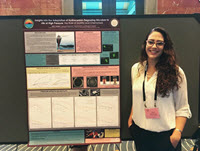
There are currently over 30 active deep-sea drilling platforms and more than 600 areas where oil naturally seeps from the Gulf of Mexico seafloor. A massive microbial response coincided with the Deepwater Horizon subsurface oil plume, leading researchers to question how pressure may have impacted the hydrocarbon degraders. Kelli Mullane is investigating how high-pressure and low-temperature affect oil-degrading microbes’ ability to detect and move toward hydrocarbon compounds. Her research will help inform how scientists and responders apply bioremediation rates to models of deep-sea hydrocarbon fate and transport.
Kelli is a Ph.D. student with the University of California San Diego’s Scripps Institution of Oceanography and a GoMRI Scholar with the project Role of Microbial Motility for Degradation of Dispersed Oil.
Her Path
Kelli grew up dreaming of becoming a marine biologist but struggled to decide which direction to take. As an environmental science undergraduate student at Rutgers University, she gained hands-on experience working in a marine biology lab studying African cichlid fish. She had just left this lab group when she was invited to complete a George H. Cook Scholar Honors Thesis, which required her to participate in ongoing lab research.
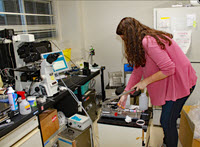
“A program director told me to search the Marine Biology department’s website for anything I thought was interesting, and I came across Dr. Costantinto Vetriani’s Deep-Sea Microbiology lab studying extremophiles (organisms that thrive in extreme conditions) at deep-sea hydrothermal vents,” said Kelli. “My microbiology knowledge was limited, but Dr. Vetriani took a chance on me and today I’m working as a Ph.D. student in a microbiology lab at one of the world’s leading oceanographic institutions.”
Kelli wanted to continue studying extremophiles in graduate school and discovered Dr. Douglas Bartlett’s high-pressure microbiology lab at the Scripps Institution of Oceanography. Their GoMRI-funded research investigates how the high pressure at the Deepwater Horizon site affected the movement of oil-degrading microbes. She was intrigued about using molecular and physiological approaches to answer questions about high-pressure environments.
“Imagine 200 elephants standing on the tip of your thumb. That’s how much pressure these deep-sea microbes experience, yet they are able to grow, divide, and interact. That’s when my curiosity kicked in!” said Kelli. “The idea that something so small survives and excels under extreme environmental conditions that would easily kill a human is mind-boggling to me.”
Her Work
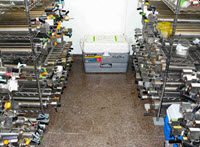
Kelli investigates how high hydrostatic pressure and low temperature influence the motility (independent movement) and chemotaxis (movement towards or away from something) of deep-sea hydrocarbon-degrading microbes. She and her colleagues work with pressure-tolerant microbial strains isolated from the Gulf following Deepwater Horizon. Her findings will help explain how pressure influences microbial bioremediation rates and inform deep-sea hydrocarbon fate and transport models.
“It’s not surprising that the microbes that responded to Deepwater Horizon are pressure-tolerant rather than piezophillic (pressure-loving),” she said. “Deepwater Horizon pressures were approximately 10 – 15 MPa, which is relatively quite low considering the high pressures our lab studies. There are natural oil seeps at much deeper depths than Deepwater Horizon, and the potential for a future anthropogenic oil spill in much deeper waters is definitely there. We wanted our research to look at Deepwater Horizon-relevant pressures as well as pressures present at greater depths.”
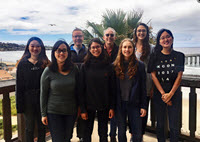
Kelli’s first experiment examined how high pressure and low temperature affect microbe motility. She worked with Kyoto University’s Dr. Masayoshi Nishiyama, who developed a small high-pressure microscopy chamber with glass windows. Kelli exposed microbes in the chamber to pressures equaling or greater than Deepwater Horizon conditions and low temperature (7°C) and recorded their movement using a high-resolution microscope. She analyzed the collected video for quantitative changes in the number and speed of swimming bacteria and observed that both factors significantly decreased microbe motility, though temperature had a greater impact on motility than pressure.
Kelli’s chemotaxis experiments will assess if in situ pressure levels inhibit microbes’ movement towards hydrocarbons (decreasing their ability to degrade hydrocarbons efficiently) or enhance it (making deep-sea biodegradation more efficient). “Researchers have investigated differences in chemotaxis-related gene expression at atmospheric and high pressure, but nobody has directly measured increased or decreased chemotaxis activity under high-pressure conditions,” she said. Kelli is developing a method to adapt previous chemotaxis studies for high-pressure research. She also plans to use transposon mutagenesis to obtain motility and chemotaxis mutants, which may help her identify genes and gene clusters important for high-pressure motility and chemotaxis.
Her Learning
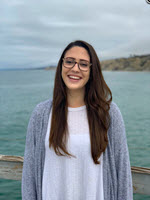
Working in Dr. Bartlett’s lab, Kelli has learned that researchers need to wear many hats. Her roles included mentoring seven undergraduate students, conceptualizing her own projects and fellowship applications, troubleshooting new protocols, and making sure the lab is well-stocked. “There is a lot that falls on my shoulders as the only Ph.D. student in the lab,” she said. “While it’s been a ton of work, it’s also made me the scientist I am today, and I wouldn’t trade that experience for anything.”
Kelli realized the value of the GoMRI science community during the 2018 Gulf of Mexico Oil Spill and Ecosystem Science (GoMOSES) conference, her first time connecting with researchers from many fields. “Getting a full sense of the community that gathered to study this oil spill was really exciting for me,” she said. “I was overjoyed to return to GoMOSES in 2019 and share the progress I’d made over the last year.” Kelli’s oral presentation at the 2019 GoMOSES conference was awarded a James D. Watkins Student Award for Excellence in Research.
Kelli believes that STEM outreach and science communication are extremely important to a scientist’s success. She currently acts as the volunteer coordinator for the Scripps Community Outreach for Public Education (SCOPE) program. The program offers free campus tours to foster scientific curiosity and environmental stewardship, provides STEM education opportunities to youth and the public, and helps graduate students improve their scientific communication and outreach skills. Kelli is also the lead coordinator for the Scripps Student Symposium (S3), a one-day conference that allows graduate students from diverse scientific backgrounds to present and discuss their research and engage in interdisciplinary collaboration.
Her Future
Kelli hopes to find a post-doc position that balances teaching and lab work so she can expand her skills and develop her long-term goals. She emphasizes to younger students that it’s okay to not know exactly what interests you, “Try something, jump in, and get your feet wet. If you realize along the way that that particular research field isn’t for you – that’s okay! Move on to a new opportunity until you find where your passion lies.”
Praise for Kelli
Dr. Bartlett said Kelli has tremendous organizational and leadership skills, including those associated with lab operations and mentoring undergraduate students. He described her as a gifted communicator able to relay her science to other researchers and to the public. “Kelli’s work performing high-pressure microscopic analyses of the motility behavior of oil-degrading Gulf of Mexico bacteria has provided an important new perspective on the factors that influence oil degradation in the deep sea.”
The GoMRI community embraces bright and dedicated students like Kelli Mullane and their important contributions. The GoMRI Scholars Program recognizes graduate students whose work focuses on GoMRI-funded projects and builds community for the next generation of ocean science professionals.
By Stephanie Ellis and Nilde Maggie Dannreuther. Contact sellis@ngi.msstate.edu for questions or comments.
************
The Gulf of Mexico Research Initiative (GoMRI) is a 10-year independent research program established to study the effect, and the potential associated impact, of hydrocarbon releases on the environment and public health, as well as to develop improved spill mitigation, oil detection, characterization and remediation technologies. An independent and academic 20-member Research Board makes the funding and research direction decisions to ensure the intellectual quality, effectiveness and academic independence of the GoMRI research. All research data, findings and publications will be made publicly available. The program was established through a $500 million financial commitment from BP. For more information, visit https://gulfresearchinitiative.org/.
© Copyright 2010-2019 Gulf of Mexico Research Initiative (GoMRI) – All Rights Reserved. Redistribution is encouraged with acknowledgement to the Gulf of Mexico Research Initiative (GoMRI). Please credit images and/or videos as done in each article. Questions? Contact web-content editor Nilde “Maggie” Dannreuther, Northern Gulf Institute, Mississippi State University (maggied@ngi.msstate.edu).
